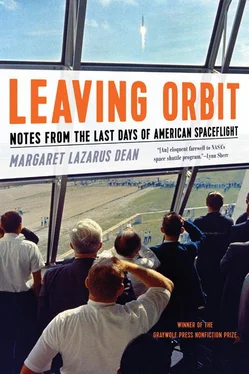“Ready.”
“You want to push the button?” he asks.
I’m surprised at first that he doesn’t have a more technical term than “push the button.” But I suppose none of the terms used in spaceflight quite apply here. “Go for main engine start” isn’t quite accurate. “Ignition” would technically be correct, I suppose, but isn’t easily made into a verb in this context (“You want to ignite?”). “Liftoff” seems overly grand when we’re talking about pushing a small plastic button. Or maybe Omar doesn’t want to make a joke of this moment—maybe he wants to enjoy this model rocket for what it is rather than pretend it’s something it’s not.
“No, you do it,” I say.
“You sure?” Omar sounds genuinely disbelieving that I am refusing the pleasure of firing the rocket. To me, his skepticism only underscores that he considers it a privilege to push the button, and that only makes me want all the more to let him be the one to do it.
“I’m sure,” I say, and get out my phone to record a video of our triumph. “Light this candle.”
I have in my phone a thirty-second video of the model rocket launch. The video starts at the moment the rocket begins to lift itself off the stand, and I wish I had thought to start recording a few seconds earlier because I would like to know whether Omar and I counted down before launching. I don’t think we did.
In the video, Omar is holding the detonator button in his left hand, his white polo shirt and light khaki shorts blinding white in the Florida sun, his skin a glowing brown. As his thumb comes down on the button, I swing over to look at the rocket, and the camera finds it already lifting off, already a few inches off the ground, by the time I get there. Within a couple of seconds it’s flying so fast and so high I have trouble finding it again. A thin smoke trail streaks out behind it, adorably, a tiny echo of the enormous steam trail of the shuttle, and my camera follows that white stripe on the sky up, up, up, far higher than I had ever expected this little model rocket could go, and when I almost can’t see it anymore it stops traveling up and levels off, the curve it makes against the bright blue sky exactly like the curve made by Challenger in my childhood. A few seconds later, the smoke trail waning, the rocket slows way down. Its recovery chute has detonated, and soon it’s possible to make out the white smudge that is the parachute against the sky. Now it will drift down toward us, at a leisurely pace, quite a way downrange of us—it’s a good thing we left as much space as we did. The rocket swings crazily back and forth under its parachute.
As the exhausted rocket drifts down and down, I can make out the dark stripes of my hair bands along its fuselage. The horizon heaves itself up into the frame—a row of perfect white clouds, a soccer goal, a faraway stand of perfect green palm trees, some stucco houses. Florida. Watching the video today, on a cool gray day in Tennessee, the sight of those palm trees stirs in me something like homesickness, though Florida has never been my home, though I still don’t understand it. What was the metaphor I thought would present itself in this rocket launch? When I watch the video, I can’t quite remember. Something about a success after yesterday’s scrub, a joke about SpaceX or about my scrubless record, but when I watch the little video in my phone I feel only the weird spaceport homesickness, that Florida nostalgia, and then the surprise and pleasure of how high and fast the actual model rocket flies. After it finishes drifting back to earth and plops itself unceremoniously onto the grass, the camera swings around again to find my friend Omar walking toward me, a huge smile on his face.
“That was a success,” my voice says, and Omar laughs happily, and then the video ends.
Планета есть колыбель разума, но нельзя вечно жить в колыбели.
(This planet is the cradle of human reason, but one cannot live in a cradle forever.)
—Konstantin Tsiolkovsky, 1911
There can be no thought of finishing [work on rockets], for “aiming at the stars,” both literally and figuratively, is a problem to occupy generations, so that no matter how much progress one makes, there is always the thrill of just beginning.
—Robert Goddard, 1932
On August 6, 2012, the Mars rover Curiosity approached the surface of Mars after a nine-month journey through interplanetary space. At NASA’s Jet Propulsion Laboratory in Pasadena, California, a room full of flight controllers and engineers bit their nails and paced the floor while Curiosity went through its complicated and daring entry sequence, nicknamed the “seven minutes of terror.” Flight control erupted in emotion when the signal indicated that Curiosity was safe on Mars. A record number of people (3.2 million) watched the landing live online, so many that the server became overloaded and temporarily shut down. A crowd gathered in Times Square to watch the landing on the big screen together, and after the successful touchdown chanted “NASA! NASA! NASA!” Millions more watched subsequently on YouTube. The flight director, a young man with a Mohawk named Bobak Ferdowsi, became an instant Internet celebrity and gained twenty thousand Twitter followers in twelve hours.
The enormous level of enthusiasm for Curiosity was encouraging for space fans like me still mourning shuttle. NASA’s deft handling of social media seemed to come to the attention of more people than ever. Curiosity has 1.4 million Twitter followers who watch its progress each day on the surface of Mars. The extent to which so many people seem to feel a personal connection to a robot, the sort of mission that used to be dismissed as too boring to keep the public interest, gives me hope. And the enthusiasm only serves to underscore the frustrating notion that Twitter might have been able to save the shuttle, if only it had come along a few years earlier.
* * *
In the middle of drafting my last chapter, I text Omar:
What does the ‘days to launch’ sign say now?
His reply:
It doesn’t. It’s covered with a bag that says ‘Safety is no accident.’
* * *
When I show him an early draft of this book, Omar is surprised to see my account of James Vanover, the engineer who jumped from the launch tower, whose death I was too shy to ask Omar about. It turns out Omar was there too, on the pad with Endeavour , the day Vanover jumped. Omar was on the launch tower, two levels above Vanover, he tells me when I ask three years later. He’d been watching the external tank to make sure birds didn’t damage it when he heard someone yelling. If he’d happened to be looking down through the open grate floor, he tells me, he would have seen Vanover silently slip over the railing to his death.
A few days later, Omar writes to tell me that the McDonald’s in Merritt Island has removed the giant plastic space shuttle from its play area. “So it’s really over,” he adds. I’ve come to know him well enough to know that this is both a joke and also a sincere observation, a moment that makes him truly sad.
* * *
I come across a photograph of Wernher von Braun taken in the last year of his life, standing in the main lobby of the National Air and Space Museum, the hushed interior of my childhood. It’s a portrait filled with quiet emotion, though it’s possible the emotion is all mine, imported from my sensory memory of Air and Space, from my knowledge that von Braun won’t live much longer. Under his polished dress shoes lies the red carpet; behind him loom the marble walls. His face is strangely tragic, his posture noble. It’s as though he knows his greatest achievement is already on its way to being forgotten, and that he won’t live long enough to see the next thing. As much as he has done, he will never get to go to space himself.
Читать дальше









